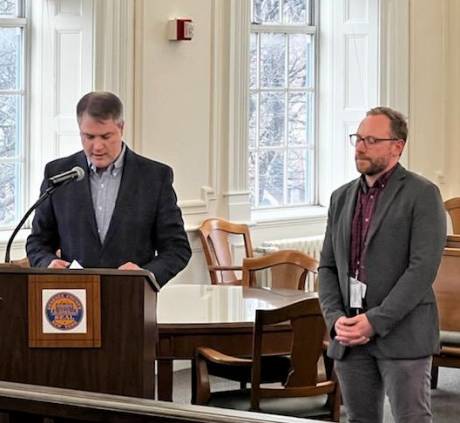From the Genesee Orleans Public Health Departments:
Love Your Own…Leave the Rest Alone! – Rabies Prevention
As stay-at-home restrictions progressed in New York State due to COVID-19, many people took this opportunity to adopt a new pet to spend their time with. Animal shelters all over the state were reporting increased adoptions and some ran out of animals altogether.
Now that it is summer and your new pets are going outside more, it is a perfect time to remind everyone how dangerous rabies can be and what you can do to prevent exposure to you, your family, and your pets.
Rabies is an infectious disease that can be fatal once symptoms (signs) show up. Rabies is a central nervous system disease which attacks the brain and causes death. It is most often spread through bites, scratches, and contact with infected saliva.
The Centers for Disease Control and Prevention (CDC) report that any mammal, including humans, can get rabies but it is most common in wild animals such as raccoons, skunks, bats and foxes, so it is wise to stay away from these animals (alive or dead).
In New York State, cats are the most frequently diagnosed domestic animals.
The best way to prevent rabies exposure is to prevent your pets from contracting the virus by keeping their rabies vaccine up-to-date, so that they do not bring it into your home. Even indoor-only pets require a vaccination.
Sarah Balduf, Environmental Health director of the Genesee and Orleans County Health Departments, reported that so far in 2020, the two counties have tested 22 animals and six tested positive for rabies. Additionally, 111 dogs and cats were observed in 10-day confinement.
An animal is subject to 10-day confinement if they are involved in an incident (i.e. biting a human) while apparently healthy. The animal’s health is monitored for 10 days to determine if rabies may be present and if further action is required. Complete details below.
Genesee County -- Animals Tested for Rabies as of June 26
Cat
Dog
Bat
Woodchuck
Raccoon
Skunk
Total Tested
1
2
2
1
3
1
Total Positive
1
0
0
0
2
1
Total 10-Day Confinements
23
53
N/A
N/A
N/A
N/A
Orleans County -- Animals Tested for Rabies as of June 26
Cat
Dog
Bat
Woodchuck
Raccoon
Cow
Total Tested
2
0
4
1
4
1
Total Positive
1
0
0
0
1
0
Total 10-Day Confinements
4
31
N/A
N/A
N/A
N/A
************************************************************************************************
One of the first signs of rabies in animals includes a change in the animal’s behavior.
“Animals may become unusually aggressive and try to bite you or other animals," Balduf said. "A wild animal might act friendly or move slowly so that you could easily get close to it. Other symptoms include staggering, convulsions, choking, excessive drooling at the mouth, and paralysis.”
When a human is infected with rabies, they may not show symptoms for up to three months. Early symptoms of rabies are often flu-like and include fever, headache, and general weakness.
As the disease progresses, symptoms include anxiety, confusion, agitation, hallucinations, hydrophobia (fear of water), and insomnia.
Once symptoms have developed, rabies is almost always fatal to both humans and animals so it is crucial to report any possible exposures as soon as they occur.
To protect yourself from rabies, people are encouraged to avoid feeding, touching, or adopting wild animals and stray domestic animals such as cats and dogs that have not been properly rescued and vetted by a shelter and veterinarian.
People are required by NYS law to keep their pets (dogs, cats and ferrets) up-to-date on their rabies vaccination.
It is recommended, though not mandatory, that livestock animals, especially valuable ones, are vaccinated as well.
It is also recommended that people keep a close eye on children who are playing outdoors and telling them the dangers of playing with wild or stray animals (alive or dead).
Anyone who has been bitten by any animal or who otherwise may have been exposed to rabies needs to take immediate action!
If you can do so safely, being careful not to damage the head/brain, capture the animal and call your local health department or a doctor to report the incident.
Capturing the animal is vital in order for it to be tested for rabies. Testing will confirm if the animal is infected with the virus or not, making sure that only those who need treatment get it.
Additionally, make sure exposed wounds or bites are cleaned thoroughly with soap and water and call your health care provider for further instructions.
(*If a bat is found in a room where there are unattended children, someone sleeping or someone who cannot speak for him/herself or your family pet, do not let the bat out of the house. To learn how to capture a bat safely, view this short video.
A doctor in consultation with the health department will determine who needs to be vaccinated with rabies post-exposure prophylaxis (RPEP).
A person who is exposed and has never been vaccinated against rabies may need to receive four doses of rabies vaccine on the following schedule: immediately, day 3, day 7, and day 14 after exposure. People who have weakened immune systems may require a fifth dose and some people required only two doses, as determined by a doctor.
The cost to treat an individual varies considerably based on weight, number of doses, and insurance. In 2020, treatment costs have ranged from $2,360 to $6,130.
Local health departments will work with the patient’s insurance company but what is not be covered by insurance is ultimately the responsibility of the taxpayers.
So far in 2020, Genesee County has had to treat six people with RPEP and Orleans County has had to treat three.
It is important that all individuals do their part to prevent rabies in the community by vaccinating their pets and practicing caution around wild or stray animals.
To protect your pets from rabies, please visit one of the upcoming rabies vaccine clinics (subject to change due to COVID-19, watch GOHealthNY social media for updates and instructions to follow COVID-19 guidelines for everyone’s safety.):
- Genesee County: Thursday, Aug. 13, at the Genesee County Fairgrounds, 5031 E. Main Road, Batavia from 4 to 7 p.m.
For information on Health Department services:
- Genesee County Health Department at: 344-2580, ext. 5555, or visit their website.



